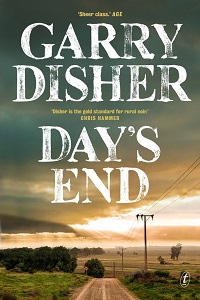
Title: Day's End
Author: Garry Disher
Pages: 400
Published Date: 1 November 2022
Publisher: Text Publishing
Series Details: 4th book in the Paul Hirschhausen series
Publisher's Synopsis
Hirsch’s rural beat is wide. Daybreak to day’s end, dirt roads and dust. Every problem that besets small towns and isolated properties, from unlicensed driving to arson. In the time of the virus, Hirsch is seeing stresses heightened and social divisions cracking wide open. His own tolerance under strain; people getting close to the edge.
Today he’s driving an international visitor around: Janne Van Sant, whose backpacker son went missing while the borders were closed. They’re checking out his last photo site, his last employer. A feeling that the stories don’t quite add up.
Then a call comes in: a roadside fire. Nothing much—a suitcase soaked in diesel and set alight. But two noteworthy facts emerge. Janne knows more than Hirsch about forensic evidence. And the body in the suitcase is not her son’s.
My Review of Day's End by Garry Disher
The 4th book in the Paul Hirschhausen series by Garry Disher, Day’s End returns the reader to the small central north South Australian town of Tiverton where Hirsch is the local cop. More than simply a crime novel, Day’s End delivers a small town experience that effectively immerses you in the rural locale and the energy of the residents surviving the harshly beautiful conditions.
Right from the start we are inundated with a series of small (and one not so small) tasks that illustrate the far-reaching purview of Hirsch’s job. Due to the seemingly mundane nature of the crimes and misdemeanours demanding Hirsch’s attention we are somewhat lulled into underestimating the undercurrents of tension within the town.
Through most of the incidents Hirsch is confronted with on a daily basis he remains calm and unperturbed. Indeed, this is a hallmark of Disher’s writing style throughout the series. At times the understatement took me by surprise. The most obvious example of this comes quite early when Hirsch is called to a fire in a wheat field and discovers a suitcase doused in diesel and set alight. Inside the suitcase is a dead body. Rather than be overtly shocked, repulsed or emotionally affected by what he has found he sets about dousing the fire.
“The sudden jolt had caused the contents to shift, and strain the zip or the fabric so that a pale, hooked, tubular shape was exposed.
And just as the realisation hit Hirsch, Dr Van Sant got there first. ‘A human elbow’.
‘My first body in a suitcase,’ Hirsch said, but it fell flat.
She was right; he could smell it now, a dense layer under the weak acidity of the smoke.
Hirsch turned, saw that Bob was trotting over with the hose. ‘Ah good.’ “
I must say, I was quite bemused by this entire scene, wondering when, or if, normal human reactions might kick in. But when he “called it in and daydreamed through the next ninety minutes” I feared a little for his sanity but soon came to realise this was more about his coping mechanism.
Disher has used the Covid pandemic and woven his story around it, picking up on the fears of people who feel they’re being controlled. The late-Covid climate means that conspiracy theories have been festoring and flourishing, people have felt they now have permission to voice their prejudices and minor uprisings against the government are beginning to build. The frequent use of the phrase ‘sovereign right’ throughout the book reflects upon the discontent, not only in the town of Tiverton and its surrounds, but the entire globe.
Tiverton, in South Australia, may be representative of many small towns in the country. The youth become bored and disillusioned and turn to finding ways to keep themselves amused. Not all of their pursuits are legal or socially acceptable. In Day’s End they manifest themselves as cyberbullying, racist acts and slurs, scamming neighbours and, of course, drug use.
But sometimes, things get taken too far and the idea of reclaiming the ‘sovereign right’ means that Hirsch’s job has just become far more complicated.
Day’s End is a superb entry in the Paul Hirschhausen series. Hirsch is proving to be a far more complex character than first appearance may have us believe. His laid back nature and sensitivity to others makes him truly relatable. This is a must-read for fans of high quality Australian small town police procedural crime fiction.
